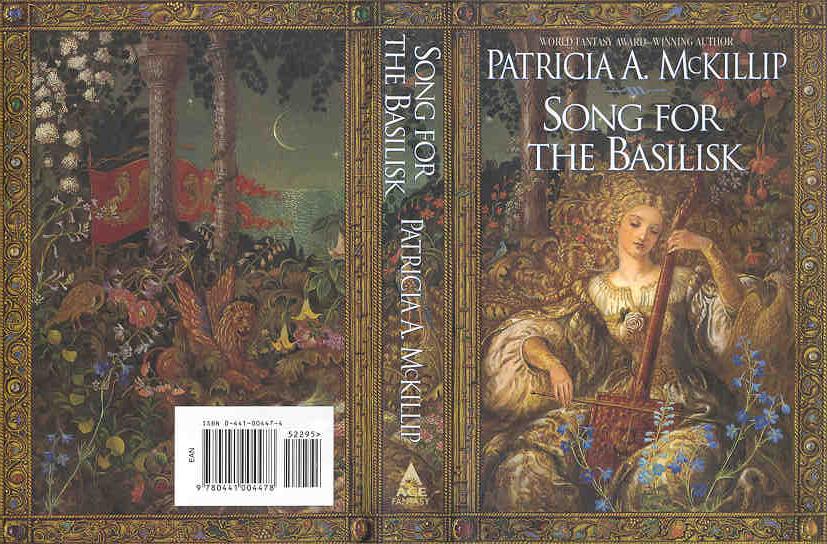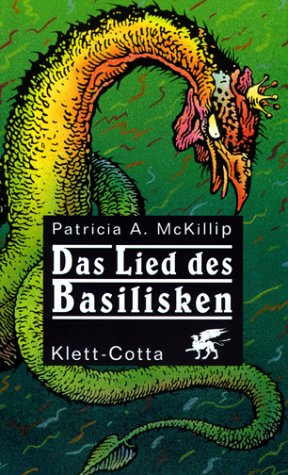
Song for the Basilisk


Inside Preview Text:
As a child, Rook had been taken in by the bards of Luly, and raised as one of their own. Of his past he knew nothing - except faint memories of fire and death that he'd do anything to forget.
But nightmares, and a new threat to the island that had become his own, would not let him escape the dreadful fate of his true family. Haunted by the music of the bards, he left the only home he knew to wander the land of the power-hungry Basilisk who had destroyed his family. And perhaps, finally, to find a future in the fulfillment of his forgotten destiny...
This book was published in 1998.
Aditi Gupta wrote this review:
Patricia McKillip, an obscure fantasy writer, has turned out yet another masterpiece. McKillip's use of magic in her fantasy novel Song for the Basilisk is as it should be, a background item, an issue of setting so the focus can be, and rightly so, on relationships (parental, enemy, and otherwise), on music, with haunting tales of how the whale got its song, on revenge.
When Arioso Pellior seizes power of Berylon, he not only affects the lives of the ruling family, but those even remotely connected to the unfortunate House of Tormalyne are crushed. The "Hamlet" of Song for the Basilisk is the only direct descendent of the House who remains alive, having been hidden in the North as a child, studying with bards that are half human and half myth. Rook has learned to breathe music to smother the memories of his family burning to death.
After thirty-seven years, the traumatic memories Rook has buried resurface when the Basilisk reaches once more to silence the whisper of Tormalyne he has heard across the realm. Forced to grasp a bitterness he did not choose and a revenge that may leave him dead, Rook journeys back to Berylon with a deadly song for the Basilisk.
In addition to the story of the protagonist, the reader follows the seemingly irrelevant paths of a music teacher, a love-struck and empty headed princess, hapless revolutionaries, and others only to see every thread converge.
Basilisk contains many references to Hamlet, such as its relation of a son forced to avenge a murdered father and a disastrous play that mimics the story of the characters. McKillip takes those same themes of revenge, justice, and filial obligation and closes with an entirely different outcome. She lightens such stiff and serious subject matters with bouts of humor, touches of magic, and musical story telling.
McKillip's writing style in Song for the Basilisk is an amazing blend of all flavors - she combines humor with convincing dialogue, lyrical imagery with compelling language. But it is her characters, as always, that hold the piece together. Each is three-dimensional, endowed with unique personality traits. And the reader is left with a stunning tale set in a fantasy parallel of Italy, with its bloody vendettas and passionate arias.
**
Jenn Zukowski writes this review:
What?? You didn’t know she’d come out with a new one? For heaven’s sake, don’t just sit there gawking at your screen, run out right now and buy it! In hardcover! Yes, you heard me!
Why, you ask? Well, you thought that Riddle-Master of Hed was a pretty suave power-wielder? Or those mysterious shape changers, or the High One himself? Or maybe you were under the impression that Atrix Wolfe was the coolest McKillip customer, chasing after faerie queens and pot-scrubbers alike, battling his inner demon with the might and vulnerability of a true hero?
Nope. Put Atrix’s book back in the mop closet. Forget those Forgotten Beasts. This is the one.
**
A child hides in the ashes of his decimated family, only to be found by straggling survivors and whisked away to the remote island of Luly, the island where they train bards. (As always in McKillip’s books, the harpers and bards possess powers the likes of which only LeGuin’s wizards ever know.) There, the child hides from his world and his past.
But Arioso Pellior, the tyrant of Berylon whose symbol (and, it seems, his being) is the basilisk, follows rumour of the almost-destroyed name of Tormalyne to Luly, and where his eye roams, fire kills. The child (all grown up now, and going by the name Caladrius) realizes his time for hiding is at an end. He puts together his seared memory, his charred heritage. He goes to Berylon, and works for his arch-enemy, the Basilisk. There, under the eye of the Basilisk (and his even more threatening daughter, Luna), he waits discreetly, invisibly, until he can play his fire-bone pipe once in deadly song.
Sound all noble, dark, and haughty? Not at all: Justin is part of an excessively young, and not-so-well-schooled-in-swordsmanship revolution. Giulia, his lover and music school magister, tries to teach Pellior’s younger, ditsy daughter, how to sing in the upcoming opera (yeesh).
I’m not going to tell you what happens, who wins, or what is going on in Luna’s head—you’ll have to read it for yourself. This book is McKillip’s finest, blending wizardly powers with musical ones, political revolution with very human characters.
And a twist at the end that will make you jump.
Go on, you convinced? Read it! Trust me!